中考英语动词时态
- 格式:doc
- 大小:154.00 KB
- 文档页数:8
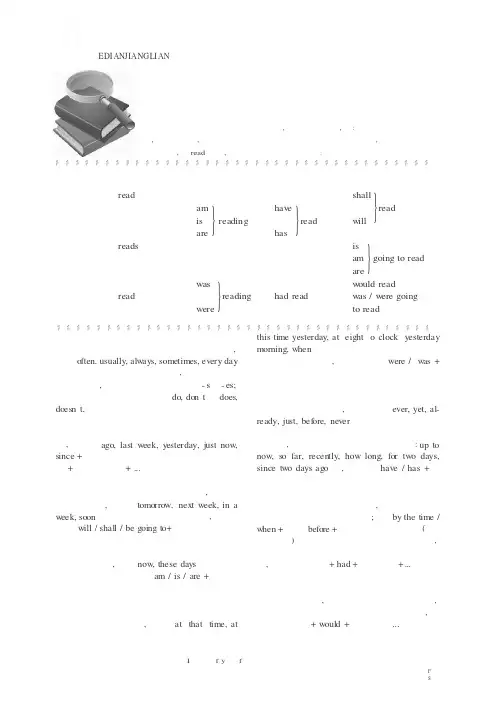

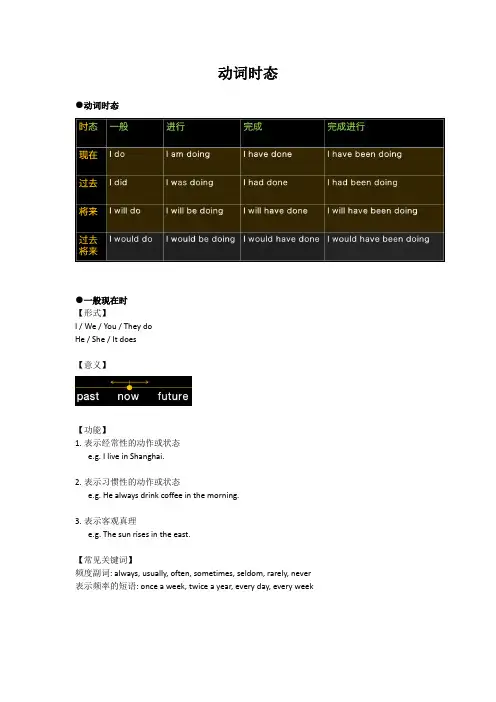
动词时态●动词时态●一般现在时【形式】I / We / You / They doHe / She / It does【意义】【功能】1.表示经常性的动作或状态e.g. I live in Shanghai.2.表示习惯性的动作或状态e.g. He always drink coffee in the morning.3.表示客观真理e.g. The sun rises in the east.【常见关键词】频度副词: always, usually, often, sometimes, seldom, rarely, never 表示频率的短语: once a week, twice a year, every day, every week●现在进行时【形式】I am doingWe / You / They are doingHe / She / It is doing【意义】【功能】1.表示现在正在进行或现阶段正在进行的动作e.g. I'm learning English with Fiona.I am reading this book these days.【常见关键词】now, at present, at the moment, for the time beinglook, listen, be careful【辨析】一般现在时vs现在进行时一般现在时:强调过去现在将来都如此的一贯性现在进行时:强调动作的暂时性(目前如此)I don't really work here. I ______ until the new secretary arrives.A) just help outB) have just helped outC) am just helping outD) will just help out●现在完成时【形式】I / We / You / They have doneHe / She / It has done【意义】【功能】1.动作从过去开始一直持续到现在,现在仍在进行并还有可能延续下去e.g. We have known each other for 7 years since I moved here.2.动作在过去完成,并对现在产生影响,影响一直持续到现在e.g. Where have you put the book? I can't see it anywhere.【常见关键词】Already(用于肯定句中), yet(用于否定句和疑问句中), just, since(自从), for+一段时间, recently, ever, never, by now, so far, in the past few years, in the last ten weeks注意:1)在完成时句中,与for, since, how long连用时,动词要用延续形式。
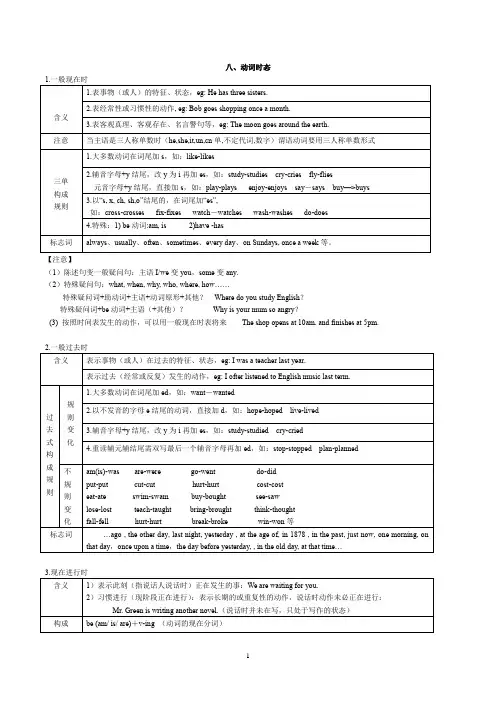
八、动词时态【注意】(1)陈述句变一般疑问句:主语I/we变you,some变any.(2)特殊疑问句:what, when, why, who, where, how……特殊疑问词+助动词+主语+动词原形+其他?Where do you study English?特殊疑问词+be动词+主语(+其他)?Why is your mum so angry?(3) 按照时间表发生的动作,可以用一般现在时表将来The shop opens at 10am. and finishes at 5pm.【注意】(1)always也可用于现在进行时,表示一种强烈的感情色彩,译为“总是”He is always telling lies.(2)某些特殊动词不能用于现在进行时。
① have当“有”讲时,不能用现在进行时。
I have two books now.②“belong to” The two people belong to me now.③表示“心理活动/状态/感觉”的词I want a dog now.① be going to主要用于:主观判断(1)表示事先经过考虑、安排好打算要做的事情:I’m going to play the violin.(2)表示根据目前某种迹象判断,某事非常有可能发生(有迹象表明要发生的事)。
Look!There come the dark clouds. It is going to rain.② will主要用于:(1)客观上将来势必发生的事情, 未经事先考虑, 临时决定的They will go to visit the factory tomorrow.(2)表示不以人的意志为转移的自然发展的未来的事:Today is Saturday. Tomorrow will be Sunday.(3)表意愿。
问对方是否愿意做某事或表示客气地邀请或命令:Will you please turn on the radio?(1) have/has been to “去过已回”She has been to Japan twice.have/has gone to. “去了未回”Where is your twin sister? She has gone to Japan.have/has been in “待在某地” She has been in Japan for 2 years. (2) 动词从词义上可以分为延续性和非延续性两种。
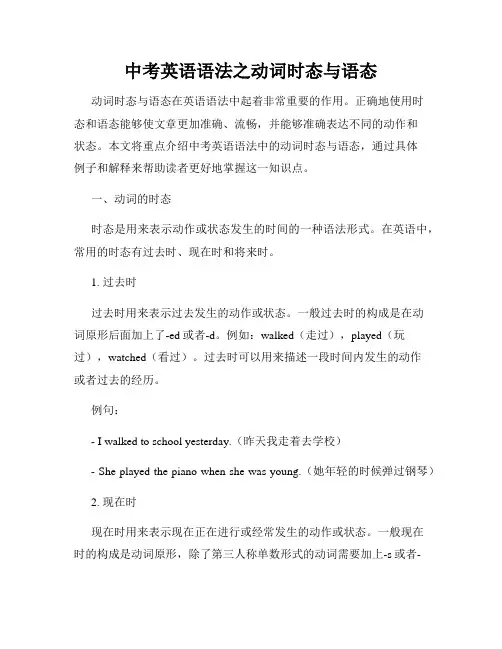
中考英语语法之动词时态与语态动词时态与语态在英语语法中起着非常重要的作用。
正确地使用时态和语态能够使文章更加准确、流畅,并能够准确表达不同的动作和状态。
本文将重点介绍中考英语语法中的动词时态与语态,通过具体例子和解释来帮助读者更好地掌握这一知识点。
一、动词的时态时态是用来表示动作或状态发生的时间的一种语法形式。
在英语中,常用的时态有过去时、现在时和将来时。
1. 过去时过去时用来表示过去发生的动作或状态。
一般过去时的构成是在动词原形后面加上了-ed或者-d。
例如:walked(走过),played(玩过),watched(看过)。
过去时可以用来描述一段时间内发生的动作或者过去的经历。
例句:- I walked to school yesterday.(昨天我走着去学校)- She played the piano when she was young.(她年轻的时候弹过钢琴)2. 现在时现在时用来表示现在正在进行或经常发生的动作或状态。
一般现在时的构成是动词原形,除了第三人称单数形式的动词需要加上-s或者-es。
例如:work(工作),plays(玩),studies(学习)。
现在时可以用来描述当前的状况、习惯的动作或者客观事实。
例句:- He works as a doctor.(他是一名医生)- They usually play basketball on weekends.(他们通常在周末打篮球)3. 将来时将来时用来表示将来要发生的动作或状态。
一般将来时的构成是用助动词will或者be going to加上动词原形。
例如:will go(将要去),is going to study(将要学习)。
将来时可以用来描述计划、打算或者预测。
例句:- I will visit my grandparents next week.(下周我将去拜访我的祖父母)- She is going to study abroad next year.(她明年要去国外学习)二、动词的语态语态是用来表示动作发生主体的一种语法形式。

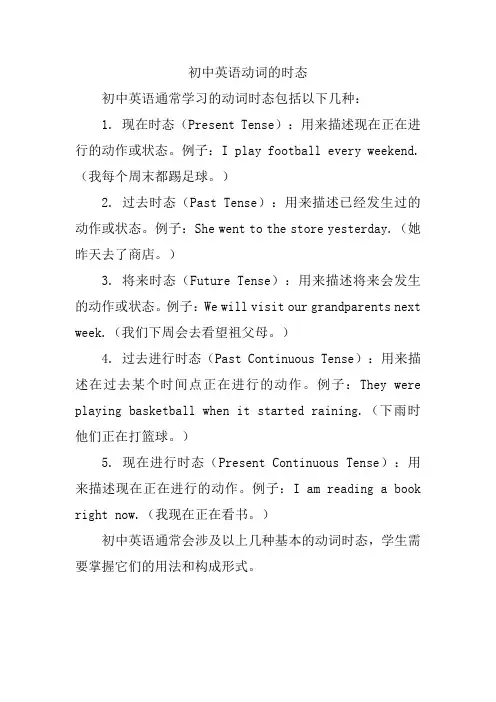
初中英语动词的时态
初中英语通常学习的动词时态包括以下几种:
1. 现在时态(Present Tense):用来描述现在正在进行的动作或状态。
例子:I play football every weekend.(我每个周末都踢足球。
)
2. 过去时态(Past Tense):用来描述已经发生过的动作或状态。
例子:She went to the store yesterday.(她昨天去了商店。
)
3. 将来时态(Future Tense):用来描述将来会发生的动作或状态。
例子:We will visit our grandparents next week.(我们下周会去看望祖父母。
)
4. 过去进行时态(Past Continuous Tense):用来描述在过去某个时间点正在进行的动作。
例子:They were playing basketball when it started raining.(下雨时他们正在打篮球。
)
5. 现在进行时态(Present Continuous Tense):用来描述现在正在进行的动作。
例子:I am reading a book right now.(我现在正在看书。
)
初中英语通常会涉及以上几种基本的动词时态,学生需要掌握它们的用法和构成形式。

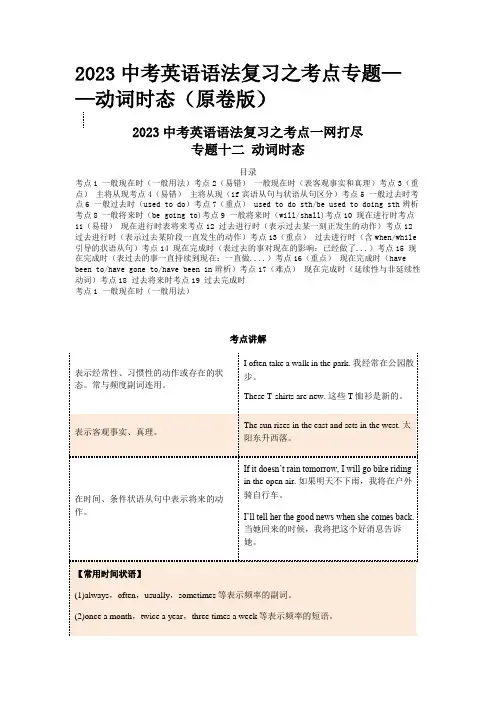
2023中考英语语法复习之考点专题——动词时态(原卷版)2023中考英语语法复习之考点一网打尽专题十二动词时态目录考点1 一般现在时(一般用法)考点2(易错)一般现在时(表客观事实和真理)考点3(重点)主将从现考点4(易错)主将从现(if宾语从句与状语从句区分)考点5 一般过去时考点6 一般过去时(used to do)考点7(重点) used to do sth/be used to doing sth辨析考点8 一般将来时(be going to)考点9 一般将来时(will/shall)考点10 现在进行时考点11(易错)现在进行时表将来考点12 过去进行时(表示过去某一刻正发生的动作)考点12 过去进行时(表示过去某阶段一直发生的动作)考点13(重点)过去进行时(含when/while 引导的状语从句)考点14 现在完成时(表过去的事对现在的影响:已经做了...)考点15 现在完成时(表过去的事一直持续到现在:一直做....)考点16(重点)现在完成时(have been to/have gone to/have been in辨析)考点17(难点)现在完成时(延续性与非延续性动词)考点18 过去将来时考点19 过去完成时考点1 一般现在时(一般用法)考点讲解1.(2021·上海松江·二模)Tim likes watching films. He _________ to the cinema with his girlfriend once a week.A.goes B.is going C.has gone D.will go2.(2020·湖北恩施)I hear that it often ________ in Sichuan and there are usually floods, especially in summer.A.rains B.rained C.will rain3.(2021·北京房山·二模)Mary ________ her grandparents every weekend.A.visits B.was visiting C.is visiting D.has visited4.(2021·广西桂林)The zebra eats grass, but it ________ eat meat.A.doesn’t B.didn’t C.don’t5.(2021·黑龙江·齐齐哈尔市碾子山区教师进修学校一模)—Do you like the flower? —Yes. It ________ sweet.A.is smelling B.smells C.smelt考点2(易错)一般现在时(表客观事实和真理)考点讲解精选练习6.(2020·天津红桥·二模)In the past, people didn't know the earth ________round the sun. A.going B.goes C.will go D.go7.(2021·吉林长春·模拟预测)The teacher told us that the sun ________ in the east. A.rises B.rise C.rose D.rising考点3(重点)主将从现考点讲解精选练习8.(2021·四川乐山)—What’s your plan for the summer holiday?—I’ll go to Chendu as soon as the school term ___________.A.end B.ends C.will end9.(2021·广西河池)Mrs. Green will take her son to the amusement park if she ________ the tickets.A.got B.gets C.is getting D.will get10.(2021·辽宁丹东)We can’t avoid traffic accidents unless everyone ________ the rules. A.follows B.breaks C.will follow D.will break考点4(易错)主将从现(if宾语从句与状语从句区分)考点讲解精选练习11.(2021·辽宁鞍山)—Tina wants to know if you ________ to the park with us tomorrow. —I’d love to. But if it ________, I may go to the library instead.A.go; will rain B.go; rains C.will go; rains D.will go; will rain12.(2020·黑龙江牡丹江)—I wonder if we ________a farewell party next week. —If we________it, I will call you.A.will have ; have B.have;will have C.will have; will have13.(2021·黑龙江哈尔滨)—I wonder if you ________ us for the English party tomorrow. —If I ________ free, I will go with you.A.will join, am B.will join, will be C.join, am考点5 一般过去时考点讲解精选练习14.(2021·广西贵港)—Where does Bill live? —He ________ me his address, but I can’t remember it now.A.tells B.told C.is telling D.will tell15.(2021·四川达州)— Alice has gone out. — Oh, has she? What time ________ she________?A.has; gone B.will; go C.did; go D.is; going16.(2021·江苏徐州)In my school days, I ________ a lot of reading in English every day. That was how I learned English at that time.A.do B.did C.have done D.will do17.(2021·重庆)Last Sunday my brother and I ________ our grandparents.A.will visit B.visits C.visit D.visited18.(2021·内蒙古兴安盟)— Have you ever been to Shanghai? — Of course. Actually, I________ there for six years, but now I live in Beijing.A.worked B.was working C.would work D.have worked考点6 一般过去时(used to do)考点讲解精选练习19.Mr Jiang isn’t as busy as before because there ___________no home robot to help him.A.used to be B.may be C.used to have D.may have20.I ________ in this small mountain village when I was a child.A.use to live B.used to living C.used to live D.used to life21.(2019·江苏镇江)Yao Ming, a basketball giant , ___________ water polo when he was young.A.is playing B.used to play C.is used to playing D.was playing考点7(重点) used to do sth/be used to doing sth辨析考点讲解精选练习22.(2020·湖南益阳)Diana used to _________ to work, but now she is used to ________ because the road is crowded and she wants to keep fit.A.drive; walk B.drive; walking C.driving; walk23.Dick __________ in America, but he has been ___________ Chinese food since he moved to China.A.used to live; used to eating B.is used to live; used to eat C.is used to live; used to eating D.used to living; used to eat24.—How does your brother go to school? —He ___________ ride a bike, but now he__________ there to keep fit.A.used to; is used to walk B.used to; is used for walking C.was used to; is used to walking D.used to; is used to walking考点8 一般将来时(be going to)考点讲解一般将来时表示将来某个时间要发生的动作,事情或存在的状态,也表示将来经常或反复发生的动作或事情。

中考语法知识点归纳动词时态语态与非谓语动词动词时态、语态与非谓语动词是中考英语中的重要考点,掌握好这些知识,将有助于提升语法水平和英语写作能力。
本文将对中考语法知识点进行归纳总结,帮助同学们更好地理解和应用。
一、动词时态动词时态是指动词表示的动作或状态发生的时间或状态。
常见的动词时态有以下几种:1. 一般现在时:表示经常性、习惯性的动作或客观真理。
例句:He plays basketball every day.2. 一般过去时:表示过去某个时间发生的动作或状态。
例句:I watched a movie last night.3. 一般将来时:表示将来要发生的动作或状态。
例句:I will go to Beijing next week.4. 现在进行时:表示现在正在进行的动作。
例句:She is reading a book now.5. 过去进行时:表示过去某个时间正在进行的动作。
例句:I was studying when he called me.6. 现在完成时:表示过去的动作对现在造成的影响或结果。
例句:She has visited Paris three times.7. 过去完成时:表示对过去某个时间之前发生的动作进行的描述。
例句:They had already left when I arrived.二、动词语态动词语态是指动作发出的主体和动作所受的影响关系。
英语中常见的动词语态有以下几种:1. 主动语态:表示主语是动作的发出者。
例句:He fixed the car yesterday.2. 被动语态:表示主语是动作的承受者。
例句:The car was fixed by him yesterday.3. 进行时态:表示主语正在进行的动作处于进行状态。
例句:The book is being read by her.4. 完成时态:表示主语已经完成的动作处于完成状态。
例句:The book has been read by her.注意:被动语态需要根据动作的时态来变换,同时需要适当更改时态动词。
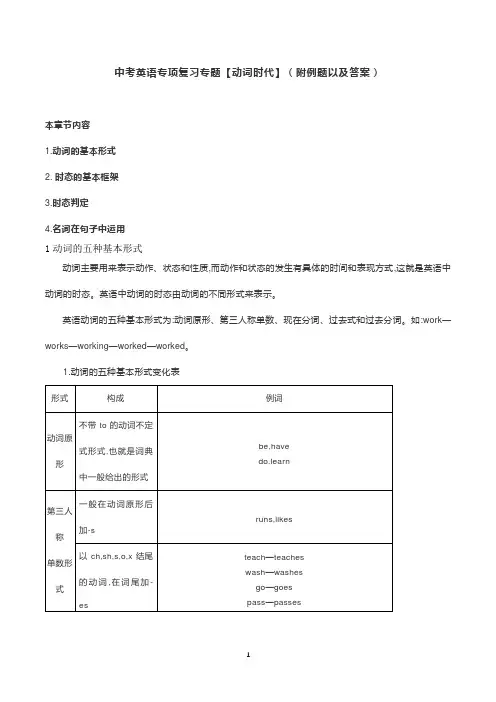
中考英语专项复习专题【动词时代】(附例题以及答案)本章节内容1.动词的基本形式2. 时态的基本框架3.时态判定4.名词在句子中运用1动词的五种基本形式动词主要用来表示动作、状态和性质,而动作和状态的发生有具体的时间和表现方式,这就是英语中动词的时态。
英语中动词的时态由动词的不同形式来表示。
英语动词的五种基本形式为:动词原形、第三人称单数、现在分词、过去式和过去分词。
如:work—works—working—worked—worked。
1.动词的五种基本形式变化表2时态的基本框架常见六种时态的构成及用法(1)一般现在时用法:①现在经常性的状态或动作;②客观事实和真理。
构成:①be+表语;②实义动词作谓语标志词:often, sometimes, usually, always, never,twice a month, every day/week/month/year(every系列)例句:He usually gets to school early.他通常很早到校。
The moon moves around the earth.月亮绕着地球转。
练一练1.认识从实践开始Knowledge practice.2.如果明天下雨,我们就不去公园了。
If it tomorrow,we to the park.【答案】1. begins with.2.rains,won’t go(2)一般过去时用法:表示过去的动作或状态。
构成:①was/were+表语;②实义动词作谓语标志词:a moment ago,just now,ago, yesterday, last night/week/month(last系列)例句:We went to Yunnan last Monday.上周一我们去了云南。
1.She (not visit)her aunt last weekend.2.My friend,Lucy, (study)for the math test and (practice)English last night. 【答案】1.didn’t visit 2.studied practiced(3)一般将来时用法:表示将来的动作或状态。
英语中考归纳复习专题:动词的时态【动词的时态】初中阶段学习的时态有以下八种:一般现在时、一般过去时、一般将来时、现在进行时、过去进行时、现在完成时、过去完成时、过去将来时.前六种为常考时态,要掌握各时态的构成、用法以及标志性时间状语.【一般现在时】【考点训练1】1.My father is a teacher and he _________ (teach) in a middle school.2.Yesterday the teacher told us the earth _______ (go) around the sun.3.—When shall we begin our meeting?—We’ll begin it when Helen ___ . ()esB.cameC.will comee4.—How do you usually go to school?—I usually ___ to school on foot. ()A.goB.wentC.was goingD.will go答案:teaches goes A A【一般过去时】要点提醒:“used to+动词原形”表示过去的习惯或状态.如:Mum used to tell us stories.妈妈过去常给我们讲故事.【考点训练2】1.Mike ________ (not go) to bed until 12 o’clock last night.2.He asked if I _____ (be) a student.3.Will you please say it again?I ___ quite ___ you.()A.don’t;hearB.didn’t;hearC.don’t;heardD.didn’t;heard4.He _____ go out with his parents,but now he ____ staying at home alone. ()ed to;is used toB.is used to;used toe to;is used toed to;used to答案:didn’t go was B A【一般将来时】要点提醒:be going to与will的区别1.be going to 指已计划好的事或思考过的意图、打算,will表示未事先思考或未计划而临时做出的决定.如:I’m going to see him tomorrow.我打算明天去看他.(事先经过思考)I’ll answer the door.我去开门.(未经事先考虑)2.be going to可表示客观迹象表明马上要发生的事,而will则表明说话者的主观意愿.如:Look at the clouds.There is going to be a storm.看看这些云,暴风雨就要来了.(客观迹象表明要发生)I hope it will be warm tomorrow.我希望明天会暖和起来.(主观意愿)3.在含有条件状语从句的复合句的主句中,一般用will,不用be going to. 如:I will come if it doesn’t rain.如果不下雨的话,我就来.【考点训练3】1.____ a concert in our school next Saturday. ()A.There isB.There areC.There will beD.There will have2.If they can arrive by 9:00 am,we ___ a meeting.()A.haveB.will haveC.hadD.would have3.He ___ her a beautiful hat on her next birthday.()A.givesB.gaveC.will givingD.is going to give答案:C B D 【现在进行时】【考点训练4】1.They ____________ (have) a math test in the classroom now.2.Look! He ___________ (lie) on the beach.3.—Pass the raincoat to me.It ___ hard now.—Here you are. ()A.rainB.is rainingC.rainedD.will rain4.—Cathy,can you answer the door?I ___ the room.—I’m coming,Mum. ()A.CleanB.cleanedC.have cleanedD.am cleaning答案:are having is lying B D【过去进行时】He was forever com plaining about something.他老是怨这怨那.要点提醒:1.在含有时间状语从句的复合句中,延续时间较长的动作常用过去进行时,另一个短暂性动作用一般过去时.如:When the UFO landed,I was shopping at the clothes store.当UFO落地时,我正在服装店买衣服.2.表示两个延续性动作在过去某一时刻同时进行,不考虑动作的先后顺序,主句和从句的谓语动词都用过去进行时,连词常用while.如:Tom was doing his homework while I was reading a newspaper.我在看报纸时,汤姆在做作业.【考点训练5】1.Mike and I ___________ (play) basketball at that time yesterday afternoon.2.While Mr.Johnson _______________ (work) in the office,the phone rang.3.The girl ___ for the bus when the rainstorm came.()A.waitedB.have waitedC.is waitingD.was waiting4.—Jenny,I called you at nine last night,but you didn’t pick up.—Oh,I ____ a popular program called Go Fighting!.()A.watchB.watchedC.was watchingD.am watching答案:were playing was working D C【现在完成时】要点提醒:1.have/has been to,have/has gone to与have/has been in(考点讲解详见P74考点1)2.延续性动词与非延续性动词英语中的动词按动作发生的方式、发生过程的长短可分为延续性动词和非延续性动词两种,非延续性动词也可称为短暂性动词或瞬间动词.在现在完成时态中,有时要将非延续性动词转换为延续性动词,这样才能和时间段连用.转换方法如下:(1)将短暂性动词转换为“be+形容词或副词”.请看下表:如:这间商店开门6小时了.The shop has opened for 6 hours.( ×)The shop has been open for 6 hours.( √)(2)有的短暂性动词可以转换为意思相同的延续性动词.请看下表:如:这本书我借了一个月了.I have borrowed the book for one month.( ×)I have kept the book for one month.( √)3.现在完成时与一般过去时的区别现在完成时强调某一动作或状态对现在造成的影响或结果,不能和表示过去的时间状语连用;一般过去时只表示过去的事实,不表示和现在的关系,可以和表示过去的时间状语连用.如I bought a ticket yesterday.我昨天买了一张票.(强调我昨天做的一件事是买票)I have already bought a ticket.我已经买了一张票.(强调我已经有票了,无须再惦记票的事了)4.现在完成时的其他句型【考点训练6】1.—you _____ your homework yet?—Yes.I ______ it a moment ago. ()A.Did;do;finishedB.Have;done;finishedC.Have;done;have finishedD.Will;do;finish2.His father ___ the Party since 1978. ()A.joinedB.has joinedC.was inD.has been in3.Miss Green isn’t in the office.She to the library. ()A.has goneB.wentC.will goD.has been 答案:B D A【过去完成时】had + 过去分词表示在过去的过去发生的动作或存在的状态.I had had three pieces of cake when you arrived.你来的时候我已经吃了三块蛋糕了.表示过去某一动作或状态持续到过去另一时间.The old man had lived in Shanghai for ten years beforeTom came here.汤姆来这儿之前,这个老人已经住在上海十年了.时间标志by the time...,before,when等构成的短语或引导的从句【考点训练7】1.在我们到达电影院之前,电影已经开始了.The film __________ before we _______ to the cinema.2.警察赶到时,小偷已经逃跑了.When the police __________,the thief____________________ .答案:had begun got arrived had run away 【过去将来时】【考点训练8】1.李明说如果布莱恩下个月来中国,他将会很高兴.Li Ming said he ___________ happy if Brian came to China the next month.2.蒂娜说她下周三打算来参加我的生日派对.Tina said she ________________ my birthday party the next Wednesday.答案:would be was going to【中考示例】(2017·广西)If he _____ Guilin,he’ll probably go to Yangshuo. ( )A.visitsB.is visitingC.will visitD.has visited【解析】考查动词的时态.句意:如果他游览桂林,他有可能会去阳朔.if引导条件状语从句时,时态遵循“主将从现”原则,从句中用一般现在时表示将来.【考题热身】1.(2017·甘肃)I promise I ________ (send) you an email to explain all of these tomorrow.2.(2017·甘肃)Be quiet! The patients ______________(sleep).3.(2017·鄂州)Sandy’s grandparents__________________ (marry) for 50 years.4.(2017·台州改编)A true friend always ____________(support) you whenever youare in trouble.5.(2017·宿迁)I ______________(wash) the dishes while my sister was sweeping the floor.6.(2017·云南)—What do you think of your hometown, Kate?—It a lot.It’s more beautiful than before. ()A.has changedB.changesC.will changeD.change7.(2017·武汉)—Linda is not coming for the party tonight.—But she ______!()A.promisesB.promisedC.will promiseD.had promised8.(2017·毕节)It’s nice to see you again.We ___ each other since 2016. ()A.won’t seeB.haven’t seenC.don’t seeD.didn’t see9.(2017·黔东南)If it doesn’t rain this weekend,we ___ a picnic in the Jinquan Park. ()A.haveB.will haveC.have hadD.had10.(2017·上海)Some exchange students ___ with their host families this time yesterday. ()A.are chattingB.will chatC.were chattingD.have chatted11.(2017·重庆B卷)—Where is your uncle?I haven’t seen him for a long time. —He _____ Beijing for about half a year.He moved there in January. ()A.has gone to B.has been toC.has arrived inD.has been in12.(2017·重庆B卷)John and I ___ to visit his grandparents last Sunday afternoon. ()A.goB.wentC.will goD.have gone13.(2017·重庆A卷)In the past few years,many schools ____ the ways of doing morning exercises. ()A.changeB.changesC.will changeD.have changed14.(2017·重庆A卷)As soon as the rain _____ ,they will go out to pick apples. ()A.stopsB.stoppedC.will stopD.is stopping15.(2017·河北)Don’t take the dictionary away.I ___ it. ()eedC.am usingD.have used答案:will send are sleeping have been married supports A B BBCDBDAC。
初中英语语法:动词时态讲解及练习初中英语语法:动词时态讲解及练动词时态专讲一、概说动词的时态历来是中考题中考查的重头戏之一。
测试重点放在根据特定语言环境区别使用一般现在时,一般过去时和现在完成时;一般现在时(过去时)与现在(过去)进行时;特定的时间状语中时态的使用;结合所获得的语言知识确定正确时态的能力等。
综上所述,动词的时态在中考测试中的地位非常重要。
因而考生在复备考中必须对本专题引起足够的重视。
构成时态二、各种时态的构成do / does一般现在时时态构成did一般过去时am / is / arewas / were现在完成时现在进行时一般将来时am / is / are + doinghave / has + doneshall / will + do曩昔完成时过去进行时过去将来时was / were + doingwould + dohad + donewas / were going + to doam / is / are going + to do普通目前时三、各种时态的用法1.透露表现经常性或气性的举措,常与透露表现频度的工夫状语连用。
时间状语:every day,every other day,sometimes,often,usually,on Sunday …I leave home for school at 7 _________________ (天天清晨).The Olympic Games are held ____________________ (每四年).What do you ____________ (平日) do when you are free on Sunday?2.用在客观真理,客观存在,科学事实或格言警句中。
The earth _________________ (绕着……转) the sun.Shanghai lies in the east of China.上海__________中国的东方。
中考英语中的16种时态整理附例句英语中的16种时态(时态整理附例句),你会熟练地运用吗?1. 一般现在时(do/does; is/am/are)①现在的动作、情况、状态和特征。
例:She is a teacher.她是一位老师②经常性、习惯性动作。
例:He always helps others.他总是帮助别人。
③客观事实和普遍真理。
如果前后文不是一般现在时,则无法保持主句、从句时态一致。
例:The earth moves round the sun.地球绕着太阳转。
④表示一个按规定、计划或安排要发生的动作。
例:The next train leaves at 3 o'clock this afternoon.下一趟火车/EIYQsbs 。
⑤在时间和条件状语从句里经常用一般现在(有时也用现在完成时)表示将来事情。
例:When you have finished the report, I will have waited for about 3 hours.等你完成这份报告的时候,我就已经等了将近3个小时了。
2. 现在进行时(am/is/are doing)①表示此时此刻正在发生的事情。
例:He is listning to the music now.他现在正在听音乐。
②表示目前一段时间内一直在做的事情,但不一定此时此刻正在做。
例:I am studying computer this term.这个学期我一直在学习计算机。
③现在进行时可以表示将来的含义。
瞬时动词的进行一定表将来。
例:I am leaving.我要离开了。
持续动词的进行只有有将来的时间状语或有将来语境中才表将来。
例:I am travelling next month.下个月我要去旅行。
④现在进行时与频度副词连用,表示说话者或褒义或贬义的感情色彩。
例:He is always helping others.他总是帮助别人。
中考英语动词的时态答题技巧及练习题(含答案)一、初中英语动词的时态1.I _______ him the good news as soon as he _______ back.A.will tell, comes B.told, comesC.will tell, will come D.tell, come【答案】A【解析】句意:他一回来,我就告诉他这个好消息。
as soon as“一……就……”,引导的时间状语从句,用一般现在时,主句用一般将来时。
第二空主语he是第三人称单数,故谓语用第三人称单数comes。
故选A。
2.Miss Smith in our school since five years ago.A.teaches B.taught C.has taught D.is teaching【答案】C【解析】句意:Smith小姐从5年前就已经在我们学校教书了。
考查现在完成时。
since five years ago自从五年前以来,意为自从五年前以来他就教我们英语,表示状态的持续,用于现在完成时;现在完成时的构成:主语+have/has+动词过去分词;主语是Miss Smith,所以助动词用has,teach教,实义动词,过去分词是taught,故答案选C。
3.—There are so many swimmers swimming in the swimming pool.—Yes, and sixty percent _ children.A.is B.are C.was D.were【答案】B【解析】句意:——在游泳池里有那么多游泳者正在游泳。
——是的,而且百分之六十是孩子。
根据谓语are可知此处用一般现在时,故排除CD两项。
此处的sixty percent代指的是百分之六十的游泳者,故谓语用复数形式,故选B。
4.—I ________ you at seven and you didn’t pick up.—I was taking a shower at that time.A.call B.calledC.am calling D.have called【答案】B【解析】句意:——我七点钟打电话给你,你没接。
英语动词时态表在英语中,动词的时态是非常重要的语法概念,它们被用来表示动作发生的时间和方式。
以下是英语动词的几种基本时态及其用法:一、现在时态1、现在进行时:表示现在正在进行的动作或存在的状态。
结构为“be 动词(am/is/are)+动词的现在分词”。
例如:I am studying now.我正在学习。
2、现在完成时:表示过去发生的动作对现在造成的影响或结果。
结构为“have/has+动词的过去分词”。
例如:I have finished my homework.我已经完成了我的作业。
二、过去时态1、过去进行时:表示过去某个时间正在进行的动作或存在的状态。
结构为“was/were+动词的现在分词”。
例如:He was playing football at 3 o’clock yesterday afternoon.昨天下午三点他正在踢足球。
2、过去完成时:表示过去的过去发生的动作对过去造成的影响或结果。
结构为“had+动词的过去分词”。
例如:They had finished theirwork before we came.在我们来到之前,他们已经完成了他们的工作。
三、将来时态1、将来进行时:表示将来某个时间正在进行的动作或存在的状态。
结构为“will be+动词的现在分词”。
例如:I will be studying at 8 o’clock tomorrow morning.我将在明天早上八点学习。
2、将来完成时:表示将来某个时间已经完成的动作或存在的状态。
结构为“will have+动词的过去分词”。
例如:I will have finished my homework by 10 o’clock tomorrow night.我将在明天晚上十点之前完成我的作业。
以上是英语动词的几种基本时态及其用法,理解和掌握这些时态对于正确使用英语有着重要的意义。
在英语中,动词的时态是非常重要的语法概念,因为它表达了动作发生的时间和状态。
中考英语语法复习动词时态知识讲解一、时态定义* 时态是英语谓语动词的一种形式,表示动作发生的时间和所处的状态。
* 英语中的时态是通过动词形式本身的变化来实现的。
英语中主要有十六种时态,在初中英语阶段主要掌握六种时态:一般现在时、现在进行时、一般将来时、一般过去时、过去进行时以及现在完成时。
二、一般现在时(一)一般现在时用法:1.一般现在时表示习惯性的动作、讲话时人或物的特性或状态。
Eg: I go to school on foot every day.我每天走路上学She has a cute dog.她又一只可爱的狗。
2.表示自然现象或客观真理时Eg: Light travels more quickly than sound.光的传播速度比声音快。
The Earth goes around the Sun.地球绕着太阳转。
3.在if引导的条件状语从句中,从句用一般现在时Eg: If it rains tomorrow, I will stay at home.如果明天下雨我就呆在家里。
(二)一般现在时的结构1.结构:肯定式:主语 + 谓语动词 + 其它否定式:主语 + don't + 谓语动词 + 其它一般疑问句:Do + 主语 + 谓语动词 + 其它特殊疑问句:特殊疑问词 + 一般疑问句注意:当主语是第三人称单数时,谓语动词要用三单形式,助动词do要变为does。
Eg: 肯定句: I work in Beijing.我在北京工作。
She works in Beijing.她在北京工作。
否定句:I don’t work in Beijing.我不在北京工作。
She doesn’t work in Bejing.她不在北京工作。
一般疑问句:Do you work in Bejing?你在北京工作吗?Does she work in Beijing?她在北京工作吗?特殊疑问句: Where do you work?你在哪工作?Where does she work?她在哪工作?2.动词三单形式变化规则(1)一般情况下直接加-s;Eg: cook -- cooks; work -- works(2)以s, x, ch, sh, o结尾的动词加-es;Eg: catch -- catches; go -- goes; do -- does(3)以辅音加y结尾,将y变成i再加-es;Eg: study -- studies; try -- tries(4)特殊变化:have -- has(三)一般现在时时间标志词一般现在时常与every day, often, usually, always, seldom, sometimes等时间状语连用。
中考英语动词时态走出题海之黄金30题系列(共12份)动词时态考点一: 一般现在时和一般过去时【经典习题】( ) 1. Now my father his bike to work every day instead of driving.A. rideB. rodeC. ridesD. will ride( ) 2. When you at a restaurant, pl ease order just enough food.A. eatB. will eatC. ateD. haven eaten ( ) 3. Our geography teacher t old us the Moon around the Earth every28 days.A. moveB. movedC. will moveD. moves( ) 4.— What did you do last night?— I TV and read a magazine.A. watchB. will watchC. watchedD. have watched( ) 5. Linda was just going out for shopping when the telephone .A. ringsB. rangC. is ringingD. has rung【考点点拨】★一般现在时表示经常发生的动作或存在的状态。
常与often, always, usually, sometimes, never, once a year, twice a month, every year / week / day, every two days 等状语连用。
★主从复合句中,若主句为一般将来时或祈使句,表时间或条件的状语从句要用一般现在时表示将来。
★当宾语从句说明的是科学真理或客观事实时,用一般现在时。
★一般过去时表示过去发生的动作或存在的状态,用was / were 或动词的过去式表示。
常与 just now, yesterday, last night / week / month /year / Sunday / January, a few days / weeks / months / years ago等时间状语或when, while, before, after等引导的表示过去的时间状语从句连用。
考点二:现在进行时和过去进行时【经典习题】( ) 1. Look! So many passengers with their smartphones on the underground.A. playedB. will playC. are playingD. have played( ) 2.—Hey, Tom! Let’s go swimming.— Just a moment. I a message.A. sendB. sentC. have sentD. am sending( ) 3.—I can’t find David. Where is he?— He for tomorrow’s test at home.A. studiesB. is studyingC. studiedD. will study ( ) 4.— I called you at about 3 yesterday afternoon, but nobody answered the phone.— Oh, I the yard at that time.A. was cleaning upB. will clean upC. am cleaning upD. have cleaned up( ) 5. Sally took a photo of her friends while they the computer game.A. playB. are playingC. have playedD. were playing【考点点拨】★现在进行时表示现在正在发生的动作或现阶段正在进行的动作,由“am /is / are + 动词的-ing形式”构成。
常与now, these days, at this moment等时间状语连用。
有时句中会出现提示性的表达,如Look!Listen!It’s nine o’clock now等。
★现在进行时还可以表示按计划或安排将要进行的动作。
★过去进行时表示过去某一时刻或某一段时间正在进行的动作,由“was /were + 动词的-ing形式”构成。
常与then, at this time yesterday, from 8 to 10 yesterday morning 等时间状语或when, while等引导的时间状语从句连用。
考点三:一般将来时和过去将来时【经典习题】( ) 1. Zhang Wei has gone to America for further education. She in ayear.A. came backB. will come backC. has come backD.was coming back( ) 2. We have no more eggs in the fridge. Mom and buy some.A. goB. will goC. wentD. was going( ) 3. M y sister bought a new skirt just now. She it to the party tomorrow.A. wearsB. has wornC. woreD. is going to wear( ) 4. Turn on the television or open a magazine and you advertisements showing happy families.A. are often seenB. are often seeingC. will often seeD. have often seen( ) 5.—The plane is leaving right now, but Jim hasn’t arrived yet.— Well, he said he here on time.A. would comeB. can beC. will beD. is coming【考点点拨】★一般将来时表示将要发生的动作或存在的状态,由“will / shall + 动词原形”构成。
常与tomorrow, next spring / week / year, in the future, “in + 段时间”等时间状语或when, as soon as 等引导的表示将来的时间状语从句连用。
★“be going to + 动词原形”表示将要发生的事或打算、计划、决定要做某事。
★过去将来时表示从过去某一时间看来将要发生的动作,由“would + 动词原形”或“was/ were going to + 动词原形”构成,常用在主句谓语动词是一般过去时的宾语从句中。
考点四:现在完成时和过去完成时【经典习题】( ) 1. Danny hard for long to realize his dream and now he is so popular.A. worksB. would workC. was workingD. has worked ( ) 2. We our new neighbors yet, so we don’t know thei r names.A. don’t meetB. won’t meetC. haven’t metD. hadn’t met( ) 3.— Where is your mother?— She Australia and she Sydney for two weeks.A. has been to; has been inB. has gone to; has been toC. has been in; has been toD. has gone to; has been in( ) 4. By the time we got to the railway station, the train already .A. had; leftB. is; leavingC. has; leftD. will; leave( ) 5. —We all went to the cinema except y ou last night. Why didn’t you come?— Because I that movie twice.A. am watchingB. had watchedC. was watchingD.would watch【考点点拨】★现在完成时表示过去发生或完成的动作对现在造成一定影响或表示从过去某一时间开始一直延续到现在并且还可能持续的动作或状态,由“have /has+动词的-ed形式” 构成,常与already, just, yet, never, so far, for或since短语连用。
★过去完成时表示在过去某一时间或动作之前已经发生或完成的动作,由“ had + 动词的-ed形式” 构成,常与before, by, by the time, by the end of等引导的时间状语(从句)连用。
【即时操练】一、选择可以填入空白处的最佳选项。
( ) 1. Because the shop , all the T-shirts are sold at half price.A. closed downB. has closed downC. had closed downD. is closing down( ) 2. My father TV in the living room when I home just now.A. watched; getB. watched; was gettingC. was watching; gotD. was watching; was getting( ) 3. My brother is an actor. He in several films so far.A. appearsB. appearedC. is appearingD. has appeared ( ) 4. The coffee is wonderful! It doesn’t tas te like anything I before.A. haveB. was havingC. have ever hadD. had ever had( ) 5. If the weather fine, we bike riding this weekend.A. is; will goB. was; would goC. will be; would goD. will be; will go二、根据句意,用括号内所给动词的适当形式填空。